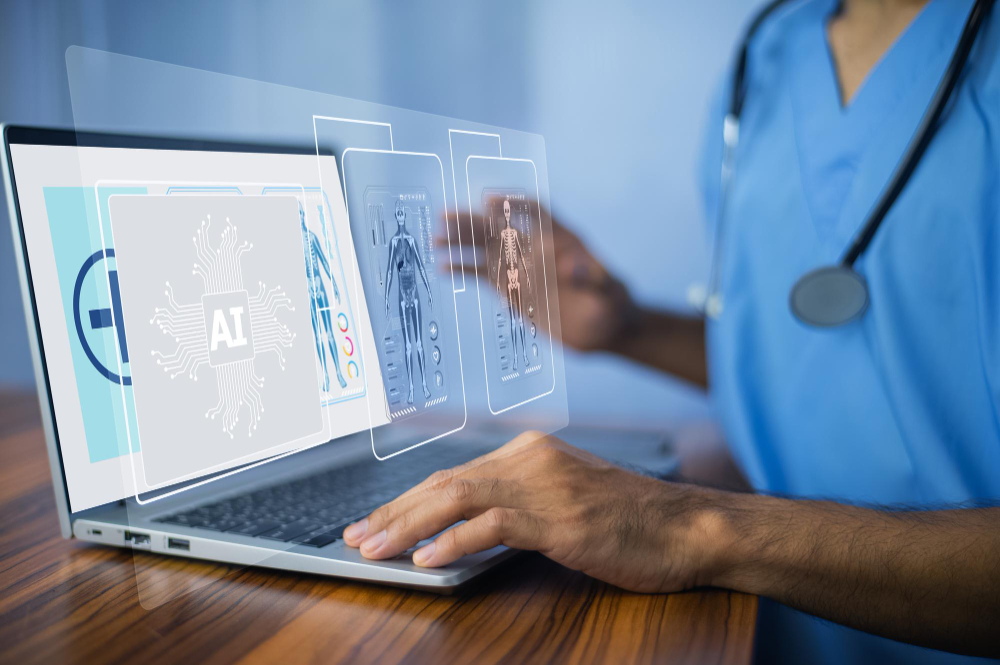
The Digital Revolution in Healthcare: Transforming the Industry
The healthcare industry is undergoing a profound transformation driven by digital innovations. Artificial intelligence (AI), telemedicine, big data analytics, and other cutting-edge technologies are revolutionizing how healthcare is delivered, managed, and experienced. This digital revolution promises to enhance patient care, improve operational efficiency, and reshape the entire healthcare landscape.
Artificial Intelligence in Healthcare
AI is making significant inroads in healthcare, offering numerous applications:
- Diagnostic Accuracy: AI algorithms can analyze medical images with high precision, often outperforming human radiologists in detecting certain conditions[1].
- Personalized Treatment Plans: AI can process vast amounts of patient data to recommend tailored treatment strategies.
- Drug Discovery: AI accelerates the drug development process by predicting potential drug candidates and their efficacy.
- Administrative Tasks: AI-powered chatbots and virtual assistants streamline patient scheduling and answer routine queries, freeing up staff for more complex tasks.
Telemedicine: Healthcare at a Distance
The COVID-19 pandemic accelerated the adoption of telemedicine, which is now becoming a permanent fixture in healthcare delivery[1][4]:
– Remote Consultations: Patients can consult with healthcare providers from the comfort of their homes, improving access to care, especially in rural areas.
– Chronic Disease Management: Telemedicine enables continuous monitoring and management of chronic conditions, reducing hospital readmissions.
– Mental Health Services: Teletherapy has made mental health support more accessible and convenient for many patients.
Big Data Analytics
The healthcare industry generates enormous amounts of data. Big data analytics helps make sense of this information:
– Population Health Management: Analyzing large datasets helps identify health trends and predict outbreaks.
– Clinical Decision Support: Data-driven insights assist healthcare providers in making more informed decisions.
– Operational Efficiency: Big data analytics optimize hospital operations, from staff scheduling to inventory management.
Internet of Medical Things (IoMT)
Connected medical devices and wearables are transforming patient care:
– Remote Patient Monitoring: IoMT devices allow continuous monitoring of patients’ vital signs and health metrics.
– Medication Adherence: Smart pill bottles and other devices help ensure patients take their medications as prescribed.
– Preventive Care: Wearable devices encourage healthier lifestyles and early detection of potential health issues.
Blockchain in Healthcare
Blockchain technology offers solutions to some of healthcare’s most pressing challenges:
– Secure Health Data Exchange: Blockchain enables secure and efficient sharing of patient data across healthcare providers.
– Drug Traceability: Blockchain can help combat counterfeit drugs by tracking pharmaceuticals through the supply chain.
– Smart Contracts: These can automate and streamline insurance claims processing and other administrative tasks.
Virtual and Augmented Reality
VR and AR technologies are finding innovative applications in healthcare:
– Surgical Planning and Training: Surgeons can practice complex procedures in virtual environments.
– Pain Management: VR has shown promise in reducing pain and anxiety in patients.
– Medical Education: AR enhances medical training by providing interactive 3D visualizations of anatomy.
Challenges and Considerations
While the digital revolution offers immense potential, it also presents challenges:
- Data Privacy and Security: As healthcare becomes more digitized, ensuring the security of sensitive patient data is paramount[3].
- Digital Divide: There’s a risk of exacerbating healthcare disparities if digital innovations are not accessible to all populations.
- Regulatory Hurdles: The rapid pace of innovation often outpaces regulatory frameworks, creating challenges for implementation.
- Integration with Existing Systems: Seamlessly integrating new technologies with legacy healthcare systems can be complex and costly.
Conclusion
The digital revolution is set to fundamentally transform the healthcare industry, offering the potential for more precise, efficient, and accessible care. As these technologies continue to evolve and mature, we can expect to see even more innovative applications that will reshape the healthcare landscape.
For healthcare organizations, embracing this digital transformation is not just an option but a necessity to remain competitive and provide the best possible care to patients. However, it’s crucial to implement these technologies thoughtfully, addressing challenges related to privacy, equity, and integration to ensure that the benefits of the digital revolution in healthcare are realized fully and equitably.
Citations:
[1] https://www.hrcloud.com/blog/healthcare-employment-trends-5-trends-shaping-the-industry
[2] https://hcahealthcare.com
[3] https://www.generation.org/news/employment-trends-and-challenges-in-the-healthcare-sector/
[4] https://apreehealth.com/careers-blog/5-current-healthcare-hiring-trends-you-should-know/
[5] https://www.gehealthcare.com
